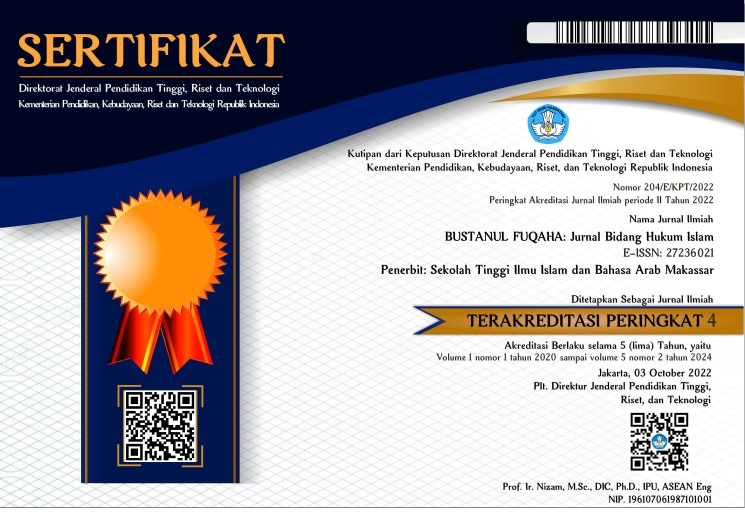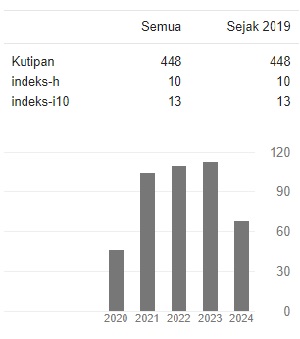Implementasi Kaidah Fikih al-Masyaqqah Tajlibu al-Taisīr dalam Fikih Ibadah Lansia (Studi Kasus Balai Lansia Gau Mabaji Gowa)
Implementation of Fiqh Rules of al-Masyaqqah Tajlibu al-Taisīr in Fiqh Worship for the Elderly (Case Study of Gau Mabaji Gowa Elderly Center)
DOI:
https://doi.org/10.36701/bustanul.v5i3.1735Keywords:
Rules of Fiqh, elderly, al-MasyaqqahAbstract
This research aims to find out the reality of elderly worship at the Gau Mabaji Gowa Elderly Center and to find out the implementation of the rules of jurisprudence for elderly worship at the Gowa Gau Mabaji Elderly Center. This type of research is field research. This research is a form of social research that uses a qualitative descriptive format. The type of approach used is a Normative Theological approach which is based on sharia elements from the Al-Qur'an and Hadith to be used as a reference related to the problem being studied. The results of this research show that 1) There are 22 elderly people at the Gau Mabaji Gowa Elderly Center and only 6 elderly people are still carrying out worship. 2) There are 3 elderly people who have applied the jurisprudence of elderly worship when performing prayers, in the form of which they pray while sitting on a chair because they are no longer able to stand for long, 3 people also apply the jurisprudence of elderly worship when purifying themselves, in the form of tayammum when they feel very cold and worried that if forced it would make them sick. The implication of this research is that it is hoped that the Government and Society will pay more attention to the needs of the elderly, not only for their clothing, food and shelter, but also for the worship needs of the elderly which are no less important. Providing an understanding of the jurisprudence of elderly worship for the elderly so that they can still carry out their worship optimally in limited circumstances.
Downloads
References
Al-Hamūdī, Minā Abdurrahman. Ahkām Al-Musinnīn Fī Al-‘Ibādāt. Riyāḍ: University King Saud, 2001.
Al-Jauzī, Abd Al-Rahmān bin ‘Alī. Zād Al-Masīr Fī ‘Ilmi Al-Tafsīr. Cet. I. Bairūt: Dār Al-Kitāb Al-‘Arabī, 1422.
Al-Nasāī, Aḥmad ibn Syu’aib. Al-Sunan Al-Ṣugrā. Ḥalab: Maktab al-Maṭbu’āt al-Islamiyyah, 1986.
Al-Quzwainī, Abu Abdillah Muhammad bin Yazīd bin Abdillah bin Mājah. Sunan Ibni Mājah. Dār Iḥyā’ al-Kutub al-‘Arabiyyah, 1952.
Badan Pusat Statistik. Statistik Penduduk Lanjut Usia 2021. Jakarta: Badan Pusat Statistik, 2021.
Hamzawi, M. Adib. “Qawaid Ushuliyah Dan Qawaid Fiqhiyah (Melacak Konstruksi Metodologi Istinbath Al-Ahkam).” Jurnal Inovatif 2, no. 2 (2016): 91.
Rizky, Hasriah. “Analisis Perbedaan Kualitas Hidup Lansia Yang Ditinggal Pasangan Berdasarkan Jenis Kelamin Dan Pola Interaksi Sosial Di Wilayah Kerja Puskesmas Tamaona Kecamatan Tombolo Pao Kabupaten Gowa.” Fakultas Keperawatan Universitas Hasanuddin, 2017.














